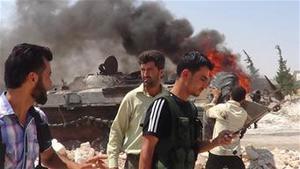Syria updateMore generals defecting, worries about Syria’s chemical munitions
A few more Syrian generals defected to Turkey this weekend; the latest defections indicate a growing problem for the regime, as those defecting come from parts of the military where loyalty to the Assad family was key to promotion; among the defectors were two Alawite generals who were operations commanders of the Alawite Shabiha militia, one of the military units closest to Assad, a third general, a Sunni, headed the Syrian chemical warfare authority until 2008; last Thursday, Syria began to move chemical munitions from storage facilities to areas closer to the fighting; the United States informed Syria that Washington would view with extreme concern the removal from storage of any more chemical weapons

More high-level defections in Syria // Source: aliwaa.com.lb
The news from Syria these past three days, in addition to the continuing death and mayhem, involves the quickening pace of high-level defections and increased worried about Syria’s large stock of chemical weapons.
The Assad regime was rocked by several high-level defections this weekend, and those defecting come from parts of the military where loyalty to the Assad family was key to promotion. In all, nine generals defected to Turkey over the weekend.
The most important of the defectors are Gen. Mohamed Tatouh, deputy chief of Syrian political intelligence, and Gen. Mohamed Kodissia, deputy chief of the Palestinian Intelligence agency (this is just the name of the agency: it does not deal with Palestinian issues). What is remarkable about these defectors is that the two generals are Alawites and were operations commanders of the Alawite Shabiha militia, one of the military units most loyal to Assad.
A third high-ranking general to defect this Sunday is Maj. Gen. Adnan Nawras Salou, a Sunny who headed the Syrian chemical warfare authority until 2008. Israeli sources say that Salou took six other generals with him, although their names were not given.
While these generals defected, another, Ali Khallouf, was ambushed by rebels in Aleppo and killed.
Last Thursday, in conjunction with a well-publicized missile tests, the Syrian military began to take chemical munitions, mostly artillery shells and warheads for short-range missiles, from centralized storage sites to areas closer to where the major clashes between the Syrian military and the rebels are taking place.
It is not clear what the Assad regime intends to do with the chemical munitions, but over the weekend the United States informed Syria that the United States viewed the removal of chemical munitions from storage with extreme concern.
Worries that Syria may decide to use chemical weapons against the rebels have increased as Assad’s hold on the country weakens. Analysts point to the fact that the only two countries to use chemical weapons since the late 1930s, when Japan used them in several battles in its war with China, were Arab countries (and fears about a third one using chemical weapons led to a NATO intervention):
- Between 1964 and 1967, the Egyptian army, fighting on the side of the republicans against the Saudi-supported royalists in the civil war in Yemen, used chemical weapons, mostly mustard gas, in its attacks against the royalist army and the villages which supported them.
- Iraq used chemical weapons much more extensively against Iran in the 1980-1988 Iran-Iraq war. It is estimated that about 100,000 Iranian soldiers were subject to Iraqi nerve gas attacks, with 20,000 dying immediately and with many of the 80,000 survivors requiring medical care. Saddam Hussein also used chemical weapons against his domestic opponents: in 1988 the Iraqi Kurdish village of Halabja was attacked by several chemical agents, killing about 5,000 of the town’s 50,000 residents.
- One of the reasons the Obama administration and NATO gave for NATO military campaign in Libya was the fear that Qaddafi, with his back against the wall, would not hesitate to use Libya’s chemical weapons against the insurgents.
Syria is not a member of the Chemical Weapons Convention (one of only seven nations not joining the treaty). It has the world’s most active chemical weapons production program, and one of the world’s largest, and if not the largest, stockpile of chemical weapons.
